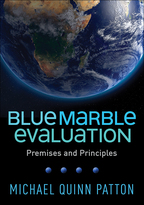Blue Marble Evaluation
Premises and Principles
Michael Quinn Patton
HardcoverPaperbacke-bookprint + e-book
Hardcover
orderNovember 1, 2019
ISBN 9781462541959
Price: $74.00 230 Pages
Size: 7" x 10"
Paperback
orderNovember 1, 2019
ISBN 9781462541942
Price: $49.00230 Pages
Size: 7" x 10"
As a transdisciplinary profession, evaluation has much to offer to global change interventions that work toward a sustainable future across national boundaries, sectors, and issues. This book introduces Blue Marble evaluation, which provides a framework for developing, adapting, and evaluating major systems change initiatives involving complex networks of stakeholders. Michael Quinn Patton demonstrates how the four overarching principles and 12 operating principles of this innovative approach allow evaluators, planners, and implementers to home in on sustainability and equity issues in an intervention. Compelling case examples, bulleted review lists, charts, and 80 original exhibits and graphics connect the global and local, the human and ecological. Rooted in utilization-focused, developmental, and principles-focused evaluation, Blue Marble evaluation is designed to tackle problems outside the reach of traditional evaluation practice.
“When Patton comes up with a concept to use in the field of evaluation, rest assured it will become a way of living and a way of doing. He has a unique and rare ability to draw immediate attention to a core idea that will touch the fabric of the field in a profound way. This book calls on evaluators to disentangle ourselves from being part of the problem in order to work toward local and global change. Blue Marble Evaluation is Patton at his best—rich with stories, lessons, and images; grounded in stories of real people who are challenged with the way our Earth is headed; and written with the audacity to spur us to rethink and transform our field.”
—Rodney Hopson, PhD, Department of Educational Psychology, University of Illinois at Urbana–Champaign
“Be prepared for one of the most profound visions for changing the destructive course of humankind. Patton takes us to a new vantage point and inspires us to think, engage, design, and evaluate in a manner that will lead to global change. The truly innovative Blue Marble and global systems transformation principles offered by Patton are likely to dramatically improve the positive influence of evaluation science on society. This is a ‘must read’ for evaluation scholars and practitioners as well as others interested in possible solutions to the most pressing local and global challenges of our time.”
—Stewart I. Donaldson, PhD, Professor of Psychology and Global Health; Executive Director, Claremont Evaluation Center; Director, The Evaluators' Institute, Claremont Graduate University
“Blue Marble Evaluation provides sobering reading about why business as usual is not enough for dealing with multiple, urgent global challenges, and describes practical ways that evaluation can be part of effective responses. This book is relevant for anyone engaged in global change initiatives or interested in the global impact of locally focused efforts. Once again, Patton challenges us to rethink evaluation—and shows us how to do so.”
—Patricia Rogers, PhD, Director, BetterEvaluation; Professor of Public Sector Evaluation, RMIT University, Australia
“Blue Marble Evaluation delivers a provocative message about the purpose of evaluation practice. Patton offers no easy path, placing evaluation in the middle of powerful polarities—global and local action, reflectiveness and urgency, boundless thinking and focus on discrete contracts. Building on his previous work on evaluation use, complexity, and social justice, Patton calls for renewed agility in evaluative thinking and practice. He invites every evaluator to commit personally to making each evaluation count. This book is a 'must read' for all evaluators who care about and regularly reflect on the purpose of their practice.”
—Tessie Tzavaras Catsambas, MPP, Founder and CEO, EnCompass, Rockville, Maryland
Table of Contents
I. The Blue Marble Perspective: Four Overarching Blue Marble Principles2. Anthropocene as Context Principle
3. Transformative Engagement Principle
4. Integration Principle
II. Blue Marble Operating Principles
5. Transboundary Engagement Principle
6. GLOCAL Principle
7. Cross-Silos Principle
8. Time Being of the Essence Principle
9. Yin–Yang Principle
10. Bricolage Methods Principle
11. World Savvy Principle
12. Skin in the Game Principle
III. Global Systems Transformation Principles
13. Theory of Transformation Principle
14. Transformation Fidelity Principle: Evaluating Transformation
15. Transformational Alignment Principle: Transforming Evaluation to Evaluate Transformation

